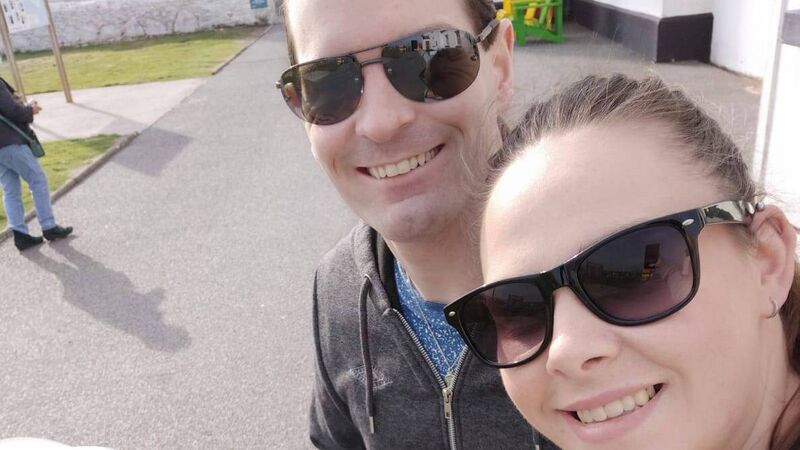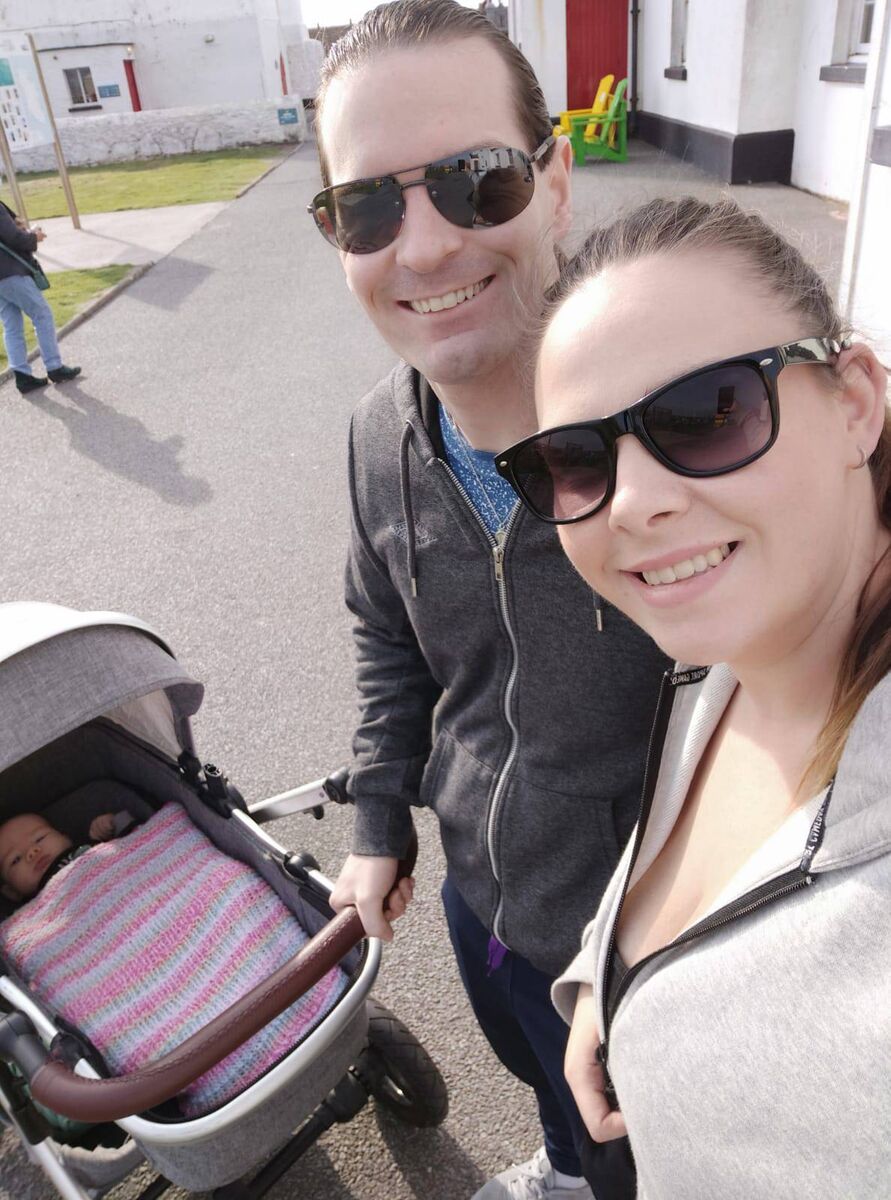'Where are our rights?' - Maternity restrictions continue to worry expectant and new mothers

Rachel Callan and her husband. "He thought he was coming to help me push, but when he arrived I wasn't there. He thought something had gone wrong."
Continued maternity ward visiting restrictions across the country are making expectant mothers fearful about giving birth, as well as leaving women who have given birth without the support of their partner with questions.
With differing levels of visiting allowed in different hospitals, the "postcode lottery" facing women has come under increasing scrutiny.
The HSE is in the process of finalising new guidelines for maternity ward visitors. However, as it stands, visiting during birth and afterwards can vary from hospital to hospital.
Rachel Callan, from Swords in Dublin, gave birth in June in Holles Street.
She had a relatively healthy pregnancy, until she began to experience severe pelvic pain from 30 weeks onward.
"I was told there was no physio available because of Covid-19," she told the .
At 35 weeks, she was signed off from work on sick leave because her pelvic pain was so bad. She was confined to bed until she went into hospital to deliver her baby.
Rachel went into labour around 3am on June 17, but by 4pm the next day, she had not progressed beyond a centimetre dilated. She was on her own in the ward due to the visiting restrictions at the time.
At 6pm, an obstetrician told her to ring her husband as they were going to manually break her waters in the hopes the labour would progress.
"They broke the waters," she said.
"I've bits and pieces of what I can remember."
Rachel was put into a surgical gown, a cannula was inserted into her hand, and a porter lifted her into a wheelchair.
"I couldn't stop shaking, it was uncontrollable. I was going for an emergency section."
Meanwhile, her husband had no idea of the danger Rachel and the baby were in.
"They put an oxygen mask on my face; it feels quite small and narrow. I'm an asthmatic, I panicked. The anesthetic was trying to get a spinal block into my back, I couldn't lift my knees by myself. Some of the staff had to lift them up for me."

Rachel said the one thing she remembers was a midwife held her hand, which gave her reassurance.
"But things were not going well, so they flipped me over and switched to general anesthesia," she said.
"I can remember the taste in the mask."
When her husband arrived, he was brought into a family room.
"He thought he was coming to help me push, but when he arrived I wasn't there. He thought something had gone wrong."
Rachel said a midwife came in with a bundle of blankets, and said "Dad?".
"He was handed our son and he asked where I was. They said I was still in theatre.
Thankfully, both Rachel and the baby were okay. Rachel woke up in a recovery ward two hours later, and saw her husband walking over to her with their son.
She thinks things would have gone differently if she had her husband there in early labour.
"It's totally disgraceful what's going on. I know they have to consider their staff and public health, but we have no one to support us," she said.
"When a woman is in labour, the most important hormone is oxytocin, but your birth partner can't come in with you for early labour and you're expected to get up to a certain centimetre on your own."
She said she is struggling to recover and suffers from flashbacks and nightmares.
"I don't want other women to suffer what we went through. It's completely unfair."
Kathleen Allen from Riverstick in Cork is due to give birth in January.
"I've suffered from HG, which is pregnancy sickness, so I was in and out of the hospital for the first 12 weeks of the pregnancy. I couldn't keep down food or water, I was severely dehydrated."
She said it was awful being in hospital on her own.
"You're going into the hospital by yourself, in a waiting room for six hours, vomiting, stuck on a drip, no one there to help you or bring you anything. I had this sickness during my first pregnancy but my husband was with me. I was so weak I could barely keep my eyes open."
While the midwives and nurses are doing their best, Kathleen said nothing compares to the support from a partner. Her husband has not been allowed in for any scans.
She is also fearful she will have to labour alone for hours before her partner is allowed in to see her.
Kathleen is also having a c-section.
"I remember the last section and, as smoothly as it went, I couldn't have done those five days in hospital afterwards without my partner. You're in bed for two days. He was there from 7am to 11pm last time. If I needed extra food, he'd get it.
"When I needed to get up and exercise, he minded the baby while I walked down to the café.
She said she wakes up every day worrying about it. Her husband will be present at the birth and for roughly an hour afterwards, and then it will be five days before she and the baby can go home.
"I think it is appalling and nonsensical. He's in the delivery theatre with me already," she said.
Kathleen also recognises that she is lucky that she has not gotten bad news in scans, and many women may have faced news about stillbirths and miscarriages on their own.
"Where are our rights? Where are the father's rights? They want to be there for their babies."
In a statement, Cork University Maternity Hospital (CUMH) said: "Following receipt of a HSE guideline on visitations during Covid-19 for maternity hospitals in the last week, Cork University Maternity Hospital, as part of the Ireland South Women & Infants Directorate will review our visiting restrictions at the Executive Management Committee meeting this week and revise our visiting restrictions accordingly."
CUMH added that women admitted for the induction of labour or who are in labour can have one nominated companion.
"This companion can only join the patient when she is in labour or called for a caesarean section."
All other inpatients, including antenatal and postnatal inpatients, are not allowed visitors.
One parent at a time can visit their baby in the Neonatal Intensive Care Unit.
Only the women attending an outpatient appointment can enter the hospital, with no partners, children or nominated companions allowed.
"We are also very sensitive to specific situations regarding pregnancy loss, stillbirth and unexpected complications and we adapt our visiting restrictions in these situations."
Holles Street said partners can attend labour and birth, and can visit mothers after birth for two-hour periods, and in adverse situations can attend outpatient appointments or scans.
"There is unrestricted visiting to the Neonatal Intensive Care Unit for parents whose babies are being cared for there. Unfortunately it is not possible for partners to accompany patients attending for surgical procedures," a spokesperson said.
Holles Street said it is very aware that visitor restrictions are adding to people's distress in very difficult and sometimes tragic circumstances.





